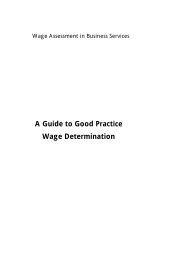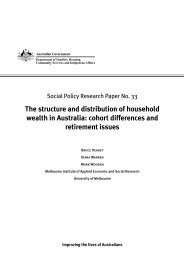partnering with community organisations - Department of Families ...
partnering with community organisations - Department of Families ...
partnering with community organisations - Department of Families ...
Create successful ePaper yourself
Turn your PDF publications into a flip-book with our unique Google optimized e-Paper software.
About this Toolkit<br />
Recently there has been an increase in the number <strong>of</strong><br />
partnerships between the business sector and <strong>community</strong><br />
<strong>organisations</strong>. This is because business is recognising that<br />
a partnership can have many business and <strong>community</strong><br />
benefits. Although this trend is positive, many small to<br />
medium sized enterprises (SMEs) do not know where<br />
to begin and, once in place, maintaining a successful<br />
partnership can be difficult.<br />
This Toolkit is written for SMEs that are interested in<br />
<strong>partnering</strong> <strong>with</strong> <strong>community</strong> <strong>organisations</strong> rather than<br />
supporting <strong>community</strong> causes through cheque book<br />
giving and/or donations.<br />
The Toolkit provides a simple eight step guide and<br />
a corresponding set <strong>of</strong> tools that will allow SMEs to<br />
establish a partnership and secure the benefits <strong>of</strong> the<br />
partnership. Included are case studies <strong>of</strong> ten SMEs<br />
from a range <strong>of</strong> industries, sizes and locations and <strong>with</strong><br />
different partnership arrangements and experiences. The<br />
case studies aim to provide useful insights into existing<br />
partnerships – the implementation process, motivation,<br />
successes and challenges - will be <strong>of</strong> most interest to<br />
those businesses just beginning the partnership journey.<br />
No two SMEs or two partnerships are the same. Therefore,<br />
the Toolkit is structured to allow for flexibility in approaches<br />
so that strategies can be tailored to suit individual<br />
organisational needs, requirements and capacities.<br />
The Toolkit will have its strongest application for:<br />
>> Privately-owned and operated businesses <strong>with</strong> less<br />
than 200 employees but more than 20 employees;<br />
>> subsidiaries and site-based operations <strong>of</strong> publicly listed<br />
companies (<strong>with</strong> less than 200 employees but more<br />
than 20 employees); and<br />
>> franchisees <strong>with</strong> more than 20 employees.<br />
The Toolkit may also have some applicability for small<br />
businesses (<strong>with</strong> up to 20 employees) that have the<br />
financial and staff resources to enter into a partnership,<br />
and for government statutory bodies that have some level<br />
<strong>of</strong> autonomy from government agencies and/or funding<br />
bodies, and that operate on business principles.<br />
Why a Toolkit for small to<br />
medium enterprises?<br />
It is generally recognised that the small to medium<br />
enterprise (SME) sector, collectively, has as much if not<br />
more impact on the economy than the larger companies<br />
listed on the leading stock exchanges. For example:<br />
>> SMEs account for over 95% <strong>of</strong> all private sector<br />
businesses and contribute around 50% <strong>of</strong> Australia’s<br />
Gross Domestic Product (GDP) turnover; and<br />
>> SMEs employ almost 3.6 million Australians totalling<br />
49% <strong>of</strong> all private sector employment.<br />
But the impact <strong>of</strong> SMEs is wider than in the economic<br />
sphere. In the social sphere, SMEs:<br />
>> promote freedom <strong>of</strong> choice for consumers and provide<br />
opportunity for entrepreneurial business ideas and<br />
development; and<br />
>> can have positive impacts by providing education<br />
and training opportunities to employees and can<br />
<strong>of</strong>ten provide minority groups, women and young<br />
entrepreneurs, <strong>with</strong> the kinds <strong>of</strong> opportunities that are<br />
unavailable or unattainable in larger corporations.<br />
SMEs are also closer to their communities. David<br />
Grayson (an expert on SMEs and responsible business)<br />
claims:<br />
…much, much more than large companies…<br />
[SMEs] are part <strong>of</strong> the <strong>community</strong>, they<br />
are controlled by people who live in the local<br />
<strong>community</strong>, whose children go to school in<br />
the local <strong>community</strong>, who are much more<br />
likely to understand the problems in the local<br />
<strong>community</strong>. Indeed, since SMEs are more<br />
location committed and less likely to move,<br />
they also are more bound up in the longterm<br />
economic health <strong>of</strong> the region/city<br />
where they are located.<br />
2 ]




![pdf [107kB] - Department of Families, Housing, Community Services](https://img.yumpu.com/51272499/1/190x245/pdf-107kb-department-of-families-housing-community-services.jpg?quality=85)










![Land Claim - pdf [278kB] - Department of Families, Housing ...](https://img.yumpu.com/47002639/1/184x260/land-claim-pdf-278kb-department-of-families-housing-.jpg?quality=85)

![Borroloola Land Claim - pdf [299kB] - Department of Families ...](https://img.yumpu.com/46103973/1/184x260/borroloola-land-claim-pdf-299kb-department-of-families-.jpg?quality=85)